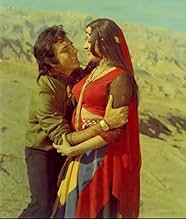Wealthy, powerful and influential Seth Dharamdas leads a financially secure life in a palatial mansion. He is known to come to the aid of all people who are beyond any hope of assistance, an... Read allWealthy, powerful and influential Seth Dharamdas leads a financially secure life in a palatial mansion. He is known to come to the aid of all people who are beyond any hope of assistance, and this leads to him being known as "Dharmatma". But Seth Dharamdas does have a number of s... Read allWealthy, powerful and influential Seth Dharamdas leads a financially secure life in a palatial mansion. He is known to come to the aid of all people who are beyond any hope of assistance, and this leads to him being known as "Dharmatma". But Seth Dharamdas does have a number of skeletons in his closet, and a parallel life as a gangster. The only person Dharamdas hates... Read all
- Dharamdas 'Dharmatma'
- (as Prem Nath)
- Jankura
- (as Danny)
- Rishi
- (as Ranjeet)
- Kundan
- (as Imtiaz)
- Anokhelal
- (as Jeevan)
- Anokhelal's brother
- (as Satyan Kapoo)
- Shanti (Mona's mom)
- (as Sulochana)
Featured reviews
This first-ever Indian adaptation of "The Godfather" actually makes things more accessible for Hindi audiences. Feroz Khan was heavily inspired by Hollywood flicks, mostly gangster flicks and Western flicks. You'll find many more adaptations and references in his filmography, but can you believe that he actually managed to pull The Godfather's adaptation in 1975, just a year after The Godfather's sequel? I still believe The Godfather is difficult to understand for mainstream Hindi audiences even today. Then let's just assume that the 70s audiences who were growing up with typical masala movies couldn't understand it properly. Those artistic references, dark theme, and heavily intense narrative-everything was new even for Hollywood audiences, then forget about Indian audiences. Feroz Khan picked the soul of The Godfather and put it in a desi body. It's much simpler and more accessible than the original, that is, for Indian audiences. He also gives a nice touch of patriotism to the main hero's character, as you see him giving up everything in the end. His main motive was revenge, not greed or money. That's the biggest strength of Dharmatma. We Indians can't really fall for the characters like Vito and Michael. We need sympathetic gestures and emotional boundings, which Dharmatms gets right. The past romance of Ranbir, i.e., Reshma, is sweet too. You get two memorable songs: "kya Khoob Lagti Ho" and "Tere Chehre Mein Wo Jadoo Hai." Hema Malini looks so gorgeous, and even Rekha plays such a cute character. Feroz Khan nails it as an actor, and Prem Nath as Dharmatma was nothing like Vito but far more localized and grounded. The supporting cast has also done well. Khan's direction is also good, actually much better than his acting. Overall, if you love The Godfather as a Hindi cinema audience, then you got to love Dharmatma.
RATING - 7/10*
By - #samthebestest.
Feroz Khan is the pioneer of stylishly made films in Hindi cinema 9/10.
Feroz Khan lends his inimitable mix of west and east style in this 1970's actioner that is inspired by the Godfather, funnily a film I don't like; of course, Dharmatma is Bollywoodized with the added melodrama, melodious songs, strained relationships between father and son, and desi violence, which gives this an enticing lure. The story execution is solid, the imagery is strong, especially of Hema's demise and Iftekhar's demise (poor windscreen). The acting is great all round with Premnath taking centre-stage as the Dharmatma and Feroz Khan plays his son who rebels with his father's ways. But it's Farida Jalal and imitiaz khan who steal the scenes.
Foremost among them is the portion of the film that plays out in Afghanistan (a first for Indian cinema). Hema Malini (as an Afghan clanswoman named Reshma !), Danny Denzongpa and Feroz Khan spice up this sequence that is remarkably well shot by any standards (Buzkashi) and lingers long after the viewing. Premnath in the title role is the other interesting aspect of the film. I'd seen him in Bobby but little else. His portrayal here is just as interesting in its angst and justification for the means he adopts as is the employment of matka (an Indian form of gambling). That it isn't expanded upon is more to do with the way the script handles the character.
Apart from these, the viewing also made me think about the meaning of the word adaptation in the cinematic idiom. When one is besotted with an original, how does one strike a balance between faithful recreation and assuming creative license ? Even more valid is the question - how does one identify the aspects of the original that may not be acceptable to the target audience of the adaptation ? For Feroz Khan in this film shares very little with Michael Corleone and undergoes a transformation so minimal in that his fundamentals are hardly shaken by the turn of events. In an act of complete dilution, he is also spared the moral dilemma of having to plan the demise of his brother-in-law too.
Did you know
- TriviaDharmatma was the first Indian film shot in Afghanistan.
- Alternate versionsThe UK release was cut, the distributor required to remove scene of rams butting each other in orchestrated fight in accordance with the Cinematograph Films (Animals) Act 1937. No uncut classification was available.
- ConnectionsFollowed by Dayavan (1988)
- How long is Dharmatma?Powered by Alexa
Details
- Release date
- Country of origin
- Language
- Also known as
- Juramento de Amor
- Filming locations
- Production company
- See more company credits at IMDbPro
- Runtime2 hours 43 minutes
- Sound mix
Contribute to this page






































